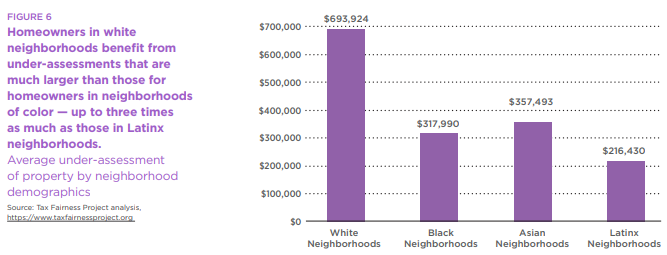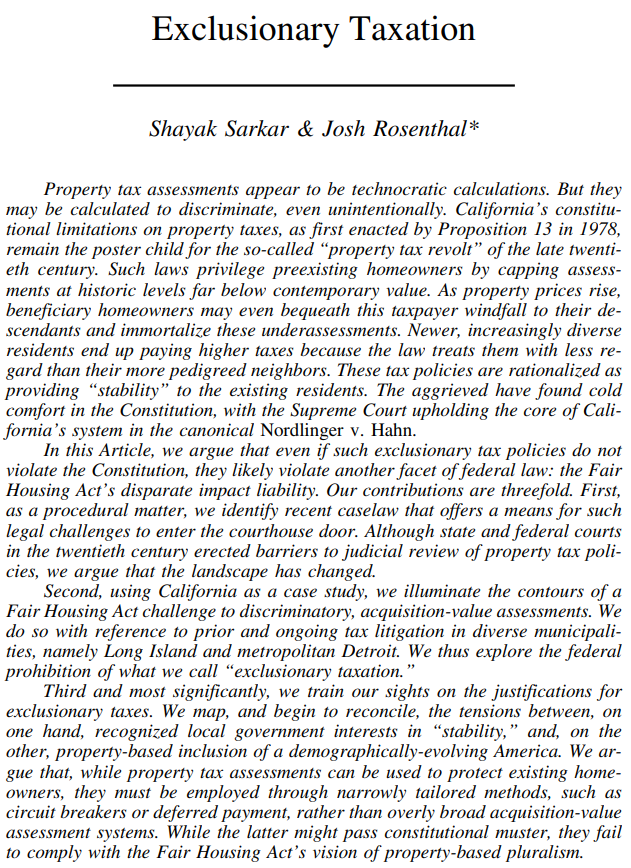Prop 13 illegally favors white neighborhoods
A great visualization by Alfred Twu:
sometimes a map gives off a "haven't I seen this map before?" vibe.
— Alfred Twu (@alfred_twu) November 15, 2020
Left: size of Prop 13 property tax subsidy that homeowners who bought a long time ago get, map by @levin_phil. https://t.co/RzJUc2NOFF
Right: Racial dot map, map by @UVACooperCenter https://t.co/I1Otit83xj pic.twitter.com/KcxjR4Glui
How does this happen? Why do white neighborhoods get larger property tax cuts than others? Answer: Prop 13.
Under Prop 13 assessment at purchase time is used to determine taxes for the duration of ownership. What’s more, these assessments are passed down through bloodlines. When the original owner dies their heirs inherit the low tax rates in addition to the appreciated property. With few exceptions, if your family bought property a long time ago, you still pay low taxes today. This holds even if the original purchase was made possible by unfair advantages which are now illegal. In this way, Prop 13 ensures that housing discrimination from the past remains enshrined forever in California law.
And of course California has a long history of housing discrimination, from redlining our major cities in the 1930s to loan discrimination as recently as 2020. But even when the law acknowledges that something is unjust, Prop 13 steps in and slows meaningful change. For example, between 2017 and 2020 City National was denying mortgages to borrowers when they were looking for homes in Black or Latino communities. Anyone who was denied such a mortgage was also denied the COVID housing price boom and, with it, the ensuing Prop 13 tax cut.
While this may not have been be the original intent of Prop 13, the net result over time is the same: white neighborhoods get the largest tax cuts. Here’s a chart showing what the effect is in Oakland:

(from https://www.spur.org/sites/default/files/2022-02/SPUR_Burdens_and_Benefits.pdf):
This is arguably illegal under the Federal Fair Housing Act
While Prop 13 was ruled constitutional in Nordlinger v. Hahn it has not been challenged under the federal Fair Housing Act (FHA). Prop 13 can still be overturned by the courts as it likely violates the FHA’s disparate impact liability. The idea isn’t new. It’s from Exclusionary Taxation by Shayak Sarkar & Josh Rosenthal:

There have been lawsuits which made use of the FHA in relation to property tax assessments. These may provide guidance on how to proceed on a potential suit against Prop 13:
Coleman v. Seldin
Nassau County assessed property taxes based on a combination of 1938 construction costs and 1964 land value – current market value was unused. This resulted in low assessments for homes in areas that saw high appreciation and comparatively high assessments for homes in areas that saw low appreciation.
Minority homeowners paid higher taxes relative to the value of their property compared to white homeowners. The New York Civil Liberties Union (NYCLU) filed the suit, invoking Title VI of the Civil Rights Act and Title VIII of the Fair Housing Act. A settlement was reached on March 28, 2000. A consent decree was entered into with the Court requiring the county to adopt a fair, scientific, and non-discriminatory assessment system based on fair market value and engage in mass reassessment.
Annual updates of the assessment were implemented to ensure compliance. By December 2004, the assessment rolls were considered in substantial compliance, eliminating discrimination. The NYCLU continues to monitor the implementation, and the county agreed to maintain compliance with annual assessments without further court involvement.
Morningside v. Sabree
In 2016, the ACLU of Michigan and NAACP Legal Defense Fund, representing a group of Detroit neighborhood associations and homeowners, filed a class-action lawsuit in state court against the Treasurer of Wayne County, Michigan alleging that the tax foreclosure rate in predominantly African-American neighborhoods in Wayne County is 10 to 15 times higher than the rate of foreclosures in predominantly non-African-American areas. The reason for the high foreclosure rate is because homes in African-American neighborhoods are often between double and eleven times the actual fair-market value. This is significantly higher than in white neighborhoods.
The pattern of over-assessment was acknowledged by the State in 2014 and measures were taken to correct it, however, this was too late for homeowners who were already in default and had to foreclose. The Michigan courts decided that the lawsuit’s FHA aspect should be dismissed under jurisdictional grounds. Fortunately, in July 2018, a settlement was reached allowing the foreclosed to keep their homes.
Related work
Disparate impact of Prop 13 has been quantitatively studied:
-
https://www.taxfairnessproject.org – Aligns California tax assessments with current market valuation (as reported by propertyshark in November 2020). Limited to the Bay Area.
-
Property Tax Limitation and Racial Inequality in Effective Tax Rates – This paper examines effective property tax rates reported by homeowners to the Panel Study of Income Dynamics in states with and without property tax limitation policies. The authors find that racial inequality in effective property tax rates is most exaggerated in areas with tax limitations and address Prop 13 specifically.
Today we also have access to the recent 2020 census and the updated racial dot map. This can be easily joined with California property tax data (which is public) to strengthen the existing results.
Remember, the intention of Howard Jarvis and his supporters is irrelevant. Disparate impact cares about outcome, not intent. Prop 13 can still be found to violate the law no matter if were a welfare program for low income seniors or a scheme to disadvantage minority schoolchildren. Prop 13 does not need to be voted down in a statewide ballot meause, it could quickly be overturned in a lawsuit for which the evidence is piling up.